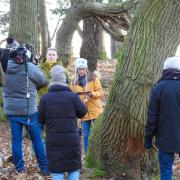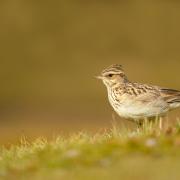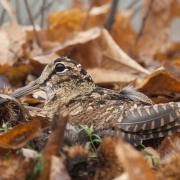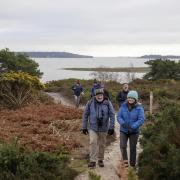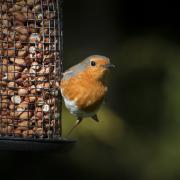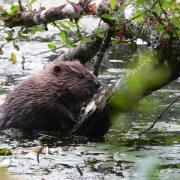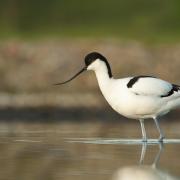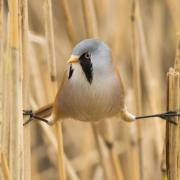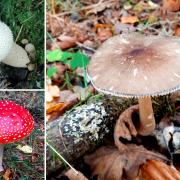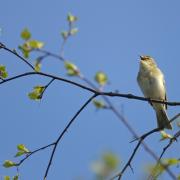Getting out in the beautiful countryside has been medically proven to help depression and obesity. Liam Andrews of Dorset Wildlife Trust explains why ecotherapy works
When people think of Dorset, they might think of our rolling hills and magnificent coastline, but how many people think of their health? Recent studies show that the countryside is fast becoming the simplest way of improving our own physical and mental health. With issues like obesity and depression affecting more of the population than ever, increasingly people are turning to nature in a bid to help improve their lives.
As part of an outreach programme, Dorset Wildlife Trust (DWT), in partnership with organisations like the Richmond Fellowship and ADCAP, has seen first-hand just how the natural environment can help transform the health of people who have struggled with both mental and physical illness.
DWT Community Conservation Officer, Briony Baxter, has seen how ecotherapy - exposure to the outdoors and nature as a form of psychotherapy – can help.
“Modern society has lost its connection to the natural world, and ecotherapy is helping to restore that bond,” says Briony.
“Whilst some people will immediately dismiss ecotherapy as holistic nonsense, evidence suggests exactly the opposite. There have been several detailed, academic studies that prove that not only does it work, but the impact it can have on someone’s life is truly astounding.”
Mind (mind.org.uk), a mental health charity, has done extensive research into the benefits of connecting with nature through their ‘Ecominds’ scheme, which promotes ecotherapy as a great way to improve your mental health.
They found that 69% of the people who took part in this scheme experienced significant improvements in their mental well-being, and 62% felt their overall health was significantly better by the time they left. Weigh this against the fifty million anti-depressant prescriptions written out in 2012 at a cost of £211m to the NHS and you can see how ecotherapy could make a real difference to our society.
“In future, activities like ecotherapy could have a massive impact on the way we live,” adds Briony. “Not only is it helping improve people’s health and state of mind, but it’s opening up the countryside to a whole new audience and giving people the opportunity to discover hidden talents and do something they’ve never done before.”
Spending time outdoors has many benefits but you don’t have to be ‘unwell’ to make the most of them. Nature is all inclusive so why don’t we all get outside and start feeling better?
***
NURTURED BY NATURE
Andy, DWT Marine Volunteer
As a senior project manager in the oil and gas industry Andy suffered high levels of stress and anxiety, which in turn elevated his blood pressure. “When I was diagnosed with hypertension in 2005 I decided to become a volunteer Marine warden at Kimmeridge Bay; after charting my blood pressure over several months I noticed a significant reduction in my blood pressure during my weekends at Kimmeridge.
“I don’t know whether it was the tranquil environment, the sea air or giving something back to nature, but volunteering really did change my life, and health, for the better.”
Eric, from Richmond Fellowship
Eric, who is from the Richmond Fellowship, says that doing work outside gives him peace of mind. “I would recommend it to anyone trying to overcome anxiety. It is hard to make the first jump, but being active and outdoors works well alongside my medication. It’s also a distraction from the things that worry me. I learn something different every time – I saw a bee orchid the other day, which I had never seen before.”
Paddy Sherlock, Gardening Volunteer at Kingcombe
Paddy is a spritely 79-year-old gardening volunteer at Dorset Wildlife Trust’s Kingcombe Centre, where she has been volunteering since 1988. “I believe that I owe my good health to spending regular time outside, getting exercise and socialising. I feed the chickens, work in the garden and do anything and everything that needs doing! I really enjoy spending time outside, and get a great deal of satisfaction from it.”
Mary Robins, Gardening Volunteer at Kingcombe
Mary started volunteering at Kingcombe when she retired eight years ago. A keen gardener she wanted to share some of her expertise and give something back to Dorset Wildlife Trust. “I enjoy helping out with the vegetable garden, and find that doing gentle physical work like this helps me stay in shape. I like seeing the food we’ve grown being used in the Kingcombe café food, and being around all the lovely wildlife on the reserve.”
***
Get Involved
Dorset Wildlife Trust runs a variety of volunteering programmes giving people the opportunity to not only enjoy the wildlife around them but to learn new skills, socialise with others and most importantly, improve both their physical and mental health.
Find out more at dorsetwildlifetrust.org.uk/volunteering.
--------------------------------------------------
Read on
• *VIDEO* Wryneck at Portland Bill• Dorset Wildlife Trust rescue Isle of Portland from rampant invader






